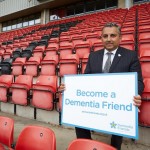A simple formula using information from routine visits to the family doctor can work out a patient’s risk of developing dementia, according to new research.
It combines social and lifestyle factors, such as poverty and BMI (body mass index), with medical diagnoses and drug prescriptions to predict possible onset of the mental illness.
The mathematical algorithm “performed well” in forecasting the danger for 60 to 79 year olds, reports the journal BMC Medicine.
It offers hope of flagging up vulnerable individuals so they can take steps to help ward off a devastating condition for which there is no known cure.
One in five people do not think it is possible to reduce their risk of dementia, despite growing evidence the condition is linked to lifestyles.
Research suggests one in three cases could be prevented by increased activity levels, a reduction in smoking and tackling health problems such as obesity and diabetes.
Just one hour’s exercise a week may reduce the chance of Alzheimer’s disease by almost half.
In the study researchers used 930,395 patients’ records to build a simple computer formula that predicted their risk of future dementia diagnoses within five years. None had any previous signs of the disease.
It used risk factors including socio-demographic measures such as age, sex and social deprivation, health and lifestyle measurements like alcohol use, BMI and blood pressure, diagnoses such as diabetes and heart disease and use of prescription medication.
The researchers checked these variables for their association with newly recorded dementia cases during the period of follow up.
They said the algorithm, called the Dementia Risk Score, could help rule out patients at very low risk for conditions such as Alzheimer’s disease in primary care.
Dr Kate Walters, of University College London, said: “It was a good discriminator, with a score of O.8 where 1 would be 100 percent accurate.
“This is better than any other test out there at the moment.
“Recent research has indicated people who eat healthily, such as following a mediterranean diet, and exercise are less likely to develop dementia, so knowing risk in advance could encourage people to change their lifestyle, which can also combat heart disease and stroke, for instance.
“There are also drugs showing promise in treatment of early dementia, so identifying people before they develop symptoms may be vital in the future.
“But we don’t want to cause anxiety, and some people may not want to know their risk of dementia in later life.
“So there are things to consider, but if NHS England recommend the test there is no reason why it cannot be available soon.
“I would also point out the overall risk of people under the age of 80 developing dementia is still relatively small, even in the higher risk group.”
The score could be especially useful for identifying people at a very low risk of dementia, as recorded by their GP.
Dr Walters said: “This could help general practitioners working with people who are anxious about developing dementia.”
Her researchers used anonymous data selected at random that had been collected by 377 general practices across the UK between 2000 and 2011 and recorded in The Health Improvement Network (THIN) database.
To validate the accuracy of their algorithm, they also selected an additional 264,224 patients, without previous recordings of dementia, from 95 different surgeries.
Both sets of patients were divided into two groups – 60 to 79 year olds and those aged 80 and above when dementia risk rises sharply.
This showed assessment models using traditional risk factors do not perform well in older people and a different approach may be needed for this group.
Risk factors that are poorly recorded in UK primary care, such as family history of dementia or physical activity, could not be included in the score.
As the current model is based on UK patient data, the researchers suggest further tests to assess the performance of their risk score for populations outside of the UK.
Added Dr Walters: “Before this score is widely used we would recommend that it is independently tested in further populations of people, and that the ethical implications of using it in practice are considered.”
The symptoms of dementia may include memory loss and difficulties with thinking, problem-solving or language.
It is caused when the brain is damaged by diseases, such as Alzheimer’s or a series of strokes.
Alzheimer’s affects one person in 20 over the age of 65, amounting to 26 million people worldwide.
In the UK, some 850,000 are affected by dementia, costing the nation an estimated £26billion a year.





